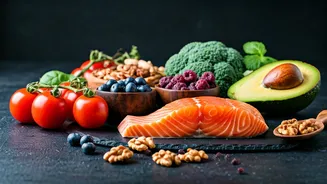Oats: The Champion
Oats are a breakfast staple, and for good reason! This whole grain is loaded with soluble fiber, particularly beta-glucan. When consumed, beta-glucan helps
lower LDL cholesterol, often called "bad" cholesterol. High LDL cholesterol is a significant risk factor for heart disease. Studies show that including oats in your daily diet can lead to a noticeable drop in cholesterol levels. Besides cholesterol benefits, oats are also filling, making them a good choice to help manage weight, which further benefits heart health. Prepare them as porridge, add them to smoothies, or use them in baked goods – oats are versatile and easy to incorporate into any meal.
Berries: Bursting Flavors
Berries, including blueberries, strawberries, and raspberries, are packed with antioxidants like anthocyanins. These antioxidants fight inflammation and protect your heart from damage. Inflammation is a key contributor to heart disease. By eating berries, you can reduce oxidative stress and improve blood vessel function. Berries are also low in calories and high in fiber, contributing to overall heart health. Consider adding berries to your breakfast cereal, yogurt, or salads. Even a handful of berries as a snack can provide significant benefits. Their natural sweetness also makes them a great alternative to processed desserts.
Fatty Fish: Omega Power
Fatty fish, such as salmon, mackerel, and sardines, are excellent sources of omega-3 fatty acids. Omega-3s are crucial for heart health because they reduce triglycerides, lower blood pressure, and decrease the risk of blood clots. Eating fatty fish regularly can also decrease the chances of irregular heartbeats. Aim to consume at least two servings of fatty fish per week. If you're not a fan of fish, consider taking an omega-3 supplement after consulting with a healthcare professional. Prepare fatty fish by baking, grilling, or steaming to maintain its health benefits.
Leafy Greens: Nutrients Galore
Leafy green vegetables, like spinach, kale, and collard greens, are incredibly nutritious. They are rich in vitamins, minerals, and antioxidants. These greens are also a good source of nitrates, which the body converts to nitric oxide. Nitric oxide helps to relax blood vessels, thus reducing blood pressure and improving blood flow. Leafy greens also contain folate, a B vitamin essential for heart health. Incorporating leafy greens into your diet is easy: add them to salads, blend them into smoothies, or sauté them as a side dish. Regular consumption of leafy greens can contribute to a stronger and healthier cardiovascular system.
Nuts and Seeds: Healthy Fats
Nuts and seeds, such as almonds, walnuts, chia seeds, and flaxseeds, are excellent sources of healthy fats, fiber, and various vitamins and minerals. They are known for lowering LDL cholesterol and improving overall heart health. These foods are also good sources of plant sterols, which can help block the absorption of cholesterol. While they are calorie-dense, a small handful of nuts or seeds can be a beneficial snack. Try adding them to your yogurt, oatmeal, or salads, or simply eat them as a quick and satisfying snack. However, ensure moderation because of their calorie density.
Avocados: Heart-Smart Choice
Avocados are another heart-friendly food containing monounsaturated fats, which help lower LDL cholesterol. They also have fiber, potassium, and antioxidants, all contributing to heart health. Potassium helps regulate blood pressure, while the fiber helps with cholesterol management. The healthy fats in avocados also support the absorption of fat-soluble vitamins. Avocados are versatile; they can be added to salads, sandwiches, or smoothies, or eaten plain. Their creamy texture and mild flavor make them a delicious and heart-healthy addition to your diet. Consider using avocado as a butter or mayonnaise substitute for added health benefits.













